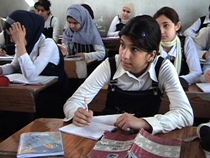Schools in the information technology capital and its surrounding areas see red over the implementation of the Right of Children to Free and Compulsory Education Act, 2009. They say it is against the prevailing state laws and plan to move court to stop the government from "imposing an additional burden on schools".
 The schools also question the government's intentions over the key provisions of the Act, such as providing 25 per cent seats free to poor students, even as the Karnataka government grapples with proper guidelines to implement the Act.
The schools also question the government's intentions over the key provisions of the Act, such as providing 25 per cent seats free to poor students, even as the Karnataka government grapples with proper guidelines to implement the Act.
When asked, the schools were reluctant to talk on the new law. Some schools said reservation was being forced on them through the Act, while others complained of lack of clarity on how the Act will be implemented. Baldwin Girls' High School, Bangalore, principal Indira Williams said: "We are yet to see the provisions of the law and, hence, we are not in a position to comment. It's too early."
Admissions for this academic year are already over and there seems to be little chance of the Act being implemented, at least so far as free seats for the poor are concerned.
According to a teacher of a private school in Bangalore West who spoke on condition of anonymity, "Our school is on good terms with the education department officials. Therefore, it can get away with any violation of norms. We have students who are children of the department. The school is already working on ways to get around the law, otherwise their income from capitation fees would be hit."
Army Public School, Bangalore, however, begs to differ. Says principal Manjula Raman: "The so-called financial burden is only in the mind. The schools that make lakhs of rupees can definitely set aside a part of their profits to educate the poor children. There is a need to raise the bar for schools that receive aid."
She adds that Army Public School by having wards of personnel from all ranks in the army ensures that it does what the Right to Education Act already envisages. "The school gives everyone an equal chance, irrespective of their financial status," she claims.
But Chand Rajpal, a senior teacher with a well-known school in south Bangalore, said: "Schools will always find a way to get around some of the provisions as it could affect their profits. A possible way is that of proxy names being added on the school rolls." She also asked: "Will the students from a poor background get justice if they end up developing a complex when having to study with their peers from well-off background?"
Incidentally, a writ petition filed in 2008 is still pending in the Karnataka High Court seeking directions to the Human Resource Development Minsitry against enforcing the Act. The petitioner, Karnataka Minorities Educational Institutions Management Federation, has argued that institutions under it are governed by the Karnataka Education Act, 1983, and there is no need to bring in another law. "The state cannot compel private unaided educational institutions to provide free education as per Section 143 of the State Act," the petitioner has argued, adding that the Right to Education Act is contrary to constitutional provisions.
No one from the state education department could be contacted, despite repeated attempts.










 © 2025
© 2025